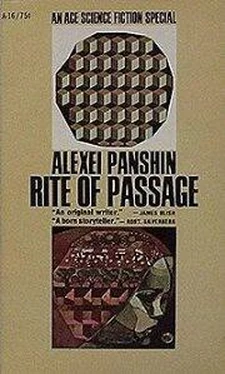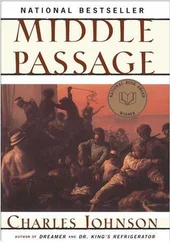There may have been other reasons, but I suspect that all this is why when Daddy became Chairman of the Ship’s Council he decided that we had to move.
Boys and girls, all of us in the Ship grew up playing soccer. I’m sure I knew how to play by the time I was four or five, and I was certainly kicking the ball around earlier than that. We used to play every chance we got, so it wasn’t surprising that I was playing soccer in the quad yard — Alfing Quad, Fourth Level — when I got word to come home. The yard stretches three floors high and two hundred yards in each direction. There’s a regulation-sized soccer field, green and beautifully kept, in the yard, but some older kids newly come back from their month of Trial and feeling twice as tall because of it had exercised their privileges and taken the field for themselves. We had moved down to the smaller field set up in the far end and were playing there.
In soccer you have a five-man front line, three halfbacks who serve as the first line of defense and who bring the ball up so the forward line can take it and score, two fullbacks who play defense only, and a goalie who guards the nets. It’s a game of constant motion that stops only when a penalty is called or when a ball goes out of bounds or when a score is made, and then stops only for a moment.
I was playing the inside left position on the forward line because I have a strong left-footed kick. It’s my natural kicking foot.
From midfield, trying to catch my breath after running hard, I watched our goalie dive on a hard boot at the nets. He was up almost instantly, bounced the ball once, then held it and kicked it high and long. The goalies are the only players on the field who are allowed to touch the ball with their hands. The rest of us have to use our heads, elbows, knees and feet. That’s what makes the game interesting.
Our right halfback knocked the ball down and trapped it with his foot. The instant he had control, he passed the ball over to Mary Carpentier at center halfback and we all started ahead on a rush for the goal.
The ball criss-crossed between our halfbacks running behind us up the field almost as though it had a life of its own, a round brown shape that darted and dodged and leaped in the air, but always was caught and controlled, never quite getting away.
Once the other team intercepted the ball and it went back past midfield, but Jay Widner picked off a bad pass and we began to rush again. Finally Mary Carpentier headed a pass to me when I was in the clear for a moment. I had a step on Venie Morlock, who was playing fullback against me. She was big, but slow. Even having to concentrate on keeping the ball moving in front of me, I was faster than she was. I had a good opening for a shot at the goal when Venie saw she couldn’t get the ball. She swerved into me, gave me a neat hip, and sent me skidding onto my face. I was running full tilt and couldn’t help myself. I went flying and hit hard. My kick went bouncing out-of-bounds wide of the white posts and the net of the goal.
I looked up, sputtering mad. “Soccer is not a contact sport!” I said.
It was like Venie to pull something like that if she saw no other way to keep from losing, and especially to me. We were confirmed old enemies, though I think it was more of a deliberate policy on her part than on mine. Just as I scrambled up from the floor the wallspeakers whistled twice for attention.
There were always announcements coming over the speakers. This time they were calling for me. They said, “Mia Havero is wanted at home. Mia Havero is wanted at home.”
Ordinarily Daddy didn’t have me paged and let me come home when I was good and ready. There was a woman named Mrs. Farmer who used to tell Daddy that I was undisciplined, but that wasn’t true. When Daddy did call for me, he only had to call once.
“Time for you to go home,” Venie said. “Run along.”
The immediate flash of anger I had felt when I was skidding along had passed, but I was still smoldering.
“I’m not ready to go yet,” I said. “I have a fresh kick coming.”
“What for?” Venie demanded. “It’s not my fault that you ran into me.”
If it was my own fault that I’d wound up on the ground, I had no reason for complaint. If it was Venie’s fault, then I had a shot at the goal coming on a major penalty. That’s soccer. I guess Venie thought if she denied doing anything long enough and loudly enough somebody would take her seriously.
Mary Carpentier, my best friend, spoke up then. “Oh, come off it, Venie,” she said. “We all saw what happened. Let Mia take her shot so she can go home.”
After some fruitless argument on Venie’s part, everybody agreed I had a free kick coming. I set the ball on the X-mark on the ground in front of the goal.
The goalie was Mrs. Farmer’s son, Peter, who was younger than I and slow enough to be put in the goal. He poised himself with his hands on his knees and waited. The goal is eight feet high and twenty-four feet wide, and the ball is set down thirty-six feet away. The goalie has a big area to cover but in two quick steps he can reach any ball aimed at the goal. It takes a good shot to get by him.
Both teams stood behind and watched as I backed off a step or two from the ball. After a moment I ran, faked a kick with my good left foot, and put a weak right-footed kick dribbling just past the goalie’s outstretched fingers into the corner of the nets. Then I left.
I dodged into the outside corridor and made straight for my shortcut. I unclipped a wall grate that provided an entrance to the air ducts, lifted it off and skinnied through the hole into the dark, and then from the inside pulled the grate back into position. That was always the hardest part, clipping the grate in place from inside. I had to stick a finger through, then turn my elbow out and up so my finger could reach the clip, then wiggle the clip until it caught. My fingers just weren’t long enough, so it was always a frustrating moment or two until I succeeded. When I had the grate in place, I turned and walked through the dark with a light steady breeze tickling my cheek. I concentrated on counting the inlets as I passed them.
Changing the Ship from a colony transport into a city was as big a job as turning my mother into an artist — her project ever since I could remember. And they had this much in common: neither was completely successful, so far as I’m concerned. In both cases there were a lot of loose ends dangling that should have been tied into neat square knots.
As an example, the point where our quad left off and the ones on either side began was completely a matter of administration, not walls. The quad itself, and they’re all this way, was a maze of blank walls, blind alleys, endless corridors, and staircases leading in odd directions. This was done on purpose — it keeps people from getting either bored or lazy, and that’s important on a Ship like ours.
In any case, there are very few straight lines, so in order to save yourself distances, you have to know which way to go. In a strange quad it’s quite possible to get lost if you don’t have a guide, and every so often they broadcast a general appeal to be on the lookout for some straying three-year-old.
I was in a hurry to make up lost time when I left the quad yard, so I had gone straight to my shortcut. If the Ship were a person, the air ducts would be the circulatory system. Your blood travels from your heart to your lungs, where it passes off carbon dioxide and picks up oxygen; back to the heart; into the body, where the oxygen is used and carbon dioxide is picked up; and then back to the heart again. The air in the Ship goes through the ducts to the Third Level, where it picks up oxygen; then through the ducts and into the Ship, where the air is breathed; then back into the ducts and down to Engineers, where water and dirt, carbon dioxide, and germs are removed, and a touch of clean water is added. They kick it around a little more, and then they blow it back up to the Third Level.
Читать дальше



![Джон Пассарелла - Обряд посвящения[Rite of passage]](/books/79646/dzhon-passarella-obryad-posvyacheniya-rite-of-passage-thumb.webp)








